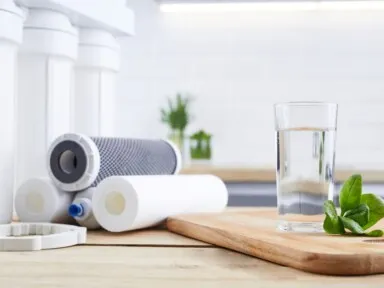Water filters play a crucial role in helping to keep your drinking water cleaner and more free from contaminants. But do water filters expire? Whether you’re wondering if your unused filters are still effective or when to replace an old one, understanding filter lifespan is essential for maintaining water quality and ensuring your water tastes as fresh as possible!
In this guide, we’ll break down how long different types of water filters last, signs that your filter needs replacing, and how to properly store and dispose of them.
In this article:
- How Long Do Water Filters Last?
- Signs Your Water Filter Needs Replacement
- What Happens if You Don’t Replace Your Water Filter?
- How To Properly Store Water Filters
- Can Water Filters Expire if Unused?
- How to Properly Dispose of Old Water Filters
- Keep Your Water Clean and Safe
- Frequently Asked Questions
How Long Do Water Filters Last?
Water filters are one of the most common types of water treatment, but they aren’t designed to last forever. Over time, they accumulate contaminants, reducing their ability to filter effectively. The lifespan of a water filter depends on its type, water quality, and usage. Each type of water filter has a unique replacement schedule. Understanding how long your filter is expected to last helps ensure your water is safer for drinking.
| Type of Water Filter | Lifespan | Common Uses |
| Pitcher Filters | 1-2 months | Ideal for small households, budget-friendly, portable |
| Faucet Filters | 2-4 months | Attaches to sink for easy access to filtered water |
| Refrigerator Filters | 6 months | Used in fridges with built-in water dispensers and ice makers |
| Under-Sink Filters | 6-12 months | Installed beneath kitchen sinks for long-term filtration |
| Whole-home water filtration | 12 months or more | Treats water for the whole house, ideal for large families or areas with poor water quality |
Factors That Affect Water Filter Lifespan
Several factors can influence how long your water filter remains effective:
- Water Quality: Hard tap water, chlorine, and high sediment levels can shorten a filter’s lifespan.
- Usage Frequency: The more you use your filter, the faster it clogs with pollutants.
- Filter Type and Brand: Some filters last longer due to advanced materials or higher capacity.
- Household Size: More people using the filter means more frequent replacements may be necessary.
- Manufacturer Recommendations: Always check your filter’s specific guidelines for optimal performance.
Replacing filters on schedule helps ensure that your water is more free from harmful contaminants and heavy metals. Check out our article on water contamination symptoms so you know what to look (or smell) for.
Signs Your Water Filter Needs Replacement
Even the best water filters don’t last forever. Over time, they become less effective at removing contaminants, which can impact the taste, smell, and clarity of your water. If you’re unsure whether your filter is still doing its job, watch for these key signs:
- Taste and odor changes in water: If your water starts to taste or smell different, your filter may no longer effectively remove contaminants.
- Reduced water flow or pressure: A clogged filter can restrict water pressure, making it harder to get purified water quickly.
- Discoloration in water: If your water looks murky, contains visible particles, or appears off-color, your filter may be overloaded with contaminants.
- Manufacturer’s recommended replacement timeline: Even if your water seems fine, following the recommended schedule ensures optimal performance and safety.
What Happens if You Don’t Replace Your Water Filter?
Regularly replacing your water filter is essential to maintaining cleaner, safer drinking water. An expired filter can no longer effectively filter out contaminants, leading to potential health risks and damage to your filtration system. Here’s what can happen if you continue using an old filter:
- Potential buildup of bacteria or harmful contaminants: Over time, bacteria, mold, and other contaminants can accumulate inside an old filter, making your water supply less safe to drink.
- Reduced filtration effectiveness: A clogged or expired filter can no longer capture impurities, allowing contaminants like chlorine, lead, and sediment to pass through.
- Impact on appliances and treatment systems: Softeners and water conditioners help protect your plumbing and appliances from buildup. An old system can lead to scale deposits, clogged pipes, and reduced efficiency in refrigerators, faucets, and whole-home water filtration systems.
Replacing your water filter on schedule helps ensure your water stays fresher, safer, and more free from harmful impurities.
How To Properly Store Water Filters
Proper storage is key to maintaining the effectiveness of unused replacement filters. Exposure to moisture, extreme temperatures, or contaminants can compromise their materials, reducing their ability to filter water properly. To maximize shelf life, store filters in their original, sealed packaging in a cool, dry place away from direct sunlight.
What is the best way to store water filters?
The best way to store water filters is in a temperature-controlled environment with minimal exposure to moisture. Store them in a cabinet or pantry, away from household chemicals, to maintain optimal condition.
Is there a difference if you live in a dry vs. humid location?
Yes, humidity can cause premature degradation or mold growth in filters, especially those with carbon-based components. In humid climates, consider storing filters in an airtight container with silica gel packs to absorb excess moisture. In dry climates, maintaining stable temperatures helps prevent material breakdown.
How does regional water quality impact filter lifespan?
Where you live plays a major role in how long your water filter lasts. Different regional water conditions impact filters in unique ways:
- Hard Water Areas: High levels of calcium and magnesium cause filters to clog faster, requiring more frequent replacements.
- Chlorinated Water: Excess chlorine can degrade filter media more quickly, reducing effectiveness over time.
- Sediment-Heavy Water: Rural areas or places with older plumbing may have more sediment in the water, which can shorten filter life by accumulating debris faster.
If you live in an area with hard water or excessive contaminants, consider using a higher-capacity filter or replacing filters more frequently to maintain optimal performance.
Can Water Filters Expire if Unused?
Yes, water filters can degrade over time, even if they remain in their packaging. While they don’t have a strict expiration date, most manufacturers recommend using them within one to two years of purchase.
Shelf life of water filters if stored in packaging
When stored properly, unused water filters remain effective for up to two years before materials degrade. However, filters containing activated carbon or resin-based components may lose efficiency faster if exposed to humidity or temperature fluctuations.
How to store unused filters to maximize their lifespan
To extend the life of unused water filters:
- Keep them sealed in their original packaging until ready for use.
- Store in a cool, dry place away from direct sunlight.
- Avoid placing filters near strong-smelling chemicals or cleaning products, as some materials can absorb odors.
- Use airtight containers for extra protection in humid environments.
How to Properly Dispose of Old Water Filters
Once a water filter has reached the end of its lifespan, proper disposal is important for both the environment and household safety. Some filters can be recycled, while others require specific disposal methods.
Recycling Options for Water Filters
Several brands and organizations offer recycling programs for used water filters, helping reduce landfill waste. Some options include:
- Brita’s recycling program (via TerraCycle)
- ZeroWater’s recycling initiative
- Local waste management facilities that accept filter components
Brands or locations that accept used filters for recycling
Check with your filter’s manufacturer to see if they offer mail-in or drop-off recycling programs. Some home improvement stores may also accept used filters for responsible disposal.
Disposal Guidelines
If recycling is not an option, follow these steps for safe disposal:
- Drain excess water from the filter to prevent bacterial growth.
- Remove plastic components (if possible) and check for local recycling guidelines.
- Seal in a bag before placing in household trash to prevent contaminants from spreading.
By choosing eco-friendly disposal methods, you help minimize environmental impact and ensure safe waste management.
Keep Your Water Clean and Safe
Replacing your water filter on time is essential for maintaining cleaner, safer drinking water and helping ensure your filtration system works as intended. Over time, filters lose their ability to remove contaminants, which can lead to bacteria buildup, reduced filtration effectiveness, and potential damage to appliances.
To protect your home’s water quality:
- Follow the manufacturer’s recommended replacement schedule.
- Check for signs that your filter needs to be replaced, such as changes in taste, odor, or water pressure.
- Store unused filters properly to maintain their effectiveness until you need them.
- Dispose of old filters responsibly through recycling programs or proper waste management.
At Leaf Home Water Solutions, we make water filtration easy with expert-backed solutions designed to fit your household’s needs. Whether you’re in search of a whole-home system or a simple filter replacement, we’re here to help you achieve cleaner, safer water for your family.
Explore Leaf Home’s Water Filtration options today!
FAQs
The replacement schedule depends on the type of filter. Pitcher filters should be replaced every 1-2 months, faucet filters every 2-4 months, and refrigerator or under-sink filters every 6-12 months. Always follow the manufacturer’s guidelines for the best results.
Using an expired water filter reduces its effectiveness and may allow contaminants to pass through. Additionally, old filters can harbor bacteria and microorganisms, impacting the safety of your drinking water.
Yes, even if left in their packaging, most water filters should be used within 1-2 years to ensure they remain as effective as possible. Proper storage in a cool, dry place helps maintain their lifespan.
Common signs include changes in taste or odor, reduced water pressure, or discoloration in the water. If you’re unsure, refer to the manufacturer’s recommended replacement timeline for your filter change.
Yes! Some brands offer recycling programs for used carbon filters. You can also check with local waste disposal services to see if they accept certain brands for eco-friendly disposal.




